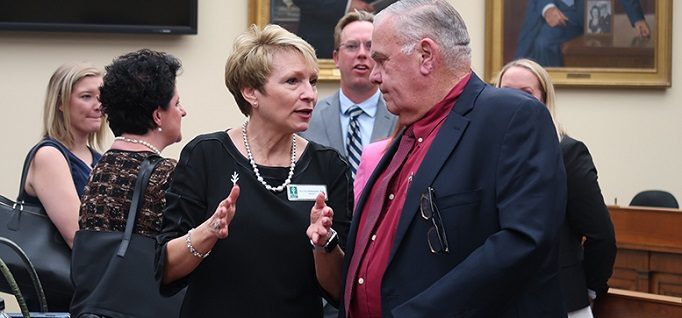AI calls for big changes in workforce training
By Ellie Ashford
October 2, 2019
Employers continue to have problems finding workers with the right skills for new jobs generated by AI systems. Community colleges are working on the solution.
Artificial intelligence (AI) is changing the nature of work and the workforce, requiring community and technical colleges to restructure programs to meet employers’ demand for new skill sets.
Sue Ellspermann, president of Ivy Tech Community College of Indiana, described how her college is meeting those needs at a recent hearing convened by the House Science, Space and Technology Committee’s Research and Technology Subcommittee.
Some 65 percent of children entering elementary school today will ultimately work in jobs that currently do not exist, said Rep. Haley Stevens (D-Michigan), who chairs the subcommittee. While automation is replacing some existing jobs, employers continue to have trouble finding workers with the right skills for new jobs generated by AI systems, she said.
Being nimble
That is creating opportunities for community colleges to quickly develop new training programs in partnership with employers in response to the growth of AI and machine learning, Ellspermann said. Among the changes underway at Ivy Tech: new flexible, interdisciplinary degrees; more online courses; shorter courses (eight weeks instead of 16); and a new comprehensive, data-driven workforce demand review process to ensure education and training programs are in sync with the local economy.
The college has partnered with the Smart Automation Certification Alliance, other community colleges and businesses to develop certificates that demonstrate competencies in IT-focused industry 4.0 skills. Ivy Tech is also collaborating with Salesforce to train students for a Salesforce developer or administrator certification, qualifying them for 300,000 positions among the company’s partner employers. In 2020, Ivy Tech will introduce new certificates into its informatics and software development associate degrees.
The college is also partnering with Apple, Cisco and the Amazon Web Academy on several certificate programs involving data analytics, cloud computing and emerging technologies.
Keep on learning
The future of education is lifelong learning, Ellspermann said.
“We know in the future we will need to develop new degrees that support careers not in existence today. The model we have now will allow us to develop those quickly and align them with the needs of our employers,” she says.
Ivy Tech campuses use a new data matrix to classify program offerings based on employer demand and enrollment. As a result, some programs were suspended – criminal justice at the South Bend campus, for example – allowing the college to reallocate faculty and resources to high-demand programs, such as supply chain management, IT and nursing.
Ellspermann urged Congress to work with community colleges and vocational schools to support future research and education needs. One way to do this, she proposed, is to allow employers to use a portion of the funds they must pay for federal unemployment insurance for upskilling employees who they know will be displaced by technology within the next two years.
Manufacturing evolves
While the manufacturing sector is estimated to produce up to 2 million new jobs over the next decade, almost 2.7 million workers are to set to retire by 2025, Rebekah Kowalski, vice president of manufacturing services at Manpower Group, told the subcommittee.
The tipping point in which the percent of labor skilled in digital technology overtakes those tied to manual and transactional tasks will happen sooner than the pace at which the workforce is prepared, she said.
“Talent cycles are shorter, so people need to upskill in short bursts,” Kowalski said.
With less than one applicant available for each job opening in manufacturing in the U.S., “finding rightly skilled talent for the manufacturing workforce has never been more challenging,” she added.
One of the 10 “big ideas” unveiled by the National Science Foundation (NSF) in 2016 as a research priority is “the future of work at the human-technology frontier,” said Arthur Lupia, assistant director for NSF’s Directorate for Social, Behavioral and Economic Sciences.
The research objectives are to advance the understanding of how technology and people interact, distribute tasks, cooperate and complement one another in specific work contexts, Lupia said. A key part of that effort is studying how to advance the knowledge base related to education training to help potential workers adapt to changing work environments, he said.
There’s more to the story! Read the full article in CC Daily.


